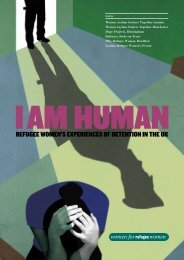Fleeing Persecution Asylum Claims in the UK on Religious Freedom
1PiV8gJ
1PiV8gJ
You also want an ePaper? Increase the reach of your titles
YUMPU automatically turns print PDFs into web optimized ePapers that Google loves.
<str<strong>on</strong>g>the</str<strong>on</strong>g> validity of any evidence and <str<strong>on</strong>g>the</str<strong>on</strong>g> credibility of <str<strong>on</strong>g>the</str<strong>on</strong>g> applicant’s statements’. 63 The applicant’s<br />
evidence can be judged aga<str<strong>on</strong>g>in</str<strong>on</strong>g>st objective evidence where available, for example country of orig<str<strong>on</strong>g>in</str<strong>on</strong>g><br />
<str<strong>on</strong>g>in</str<strong>on</strong>g>formati<strong>on</strong>. <str<strong>on</strong>g>UK</str<strong>on</strong>g> guidance recognises <str<strong>on</strong>g>the</str<strong>on</strong>g> challenges faced by asylum seekers <str<strong>on</strong>g>in</str<strong>on</strong>g> ga<str<strong>on</strong>g>the</str<strong>on</strong>g>r<str<strong>on</strong>g>in</str<strong>on</strong>g>g<br />
documentary evidence to substantiate <str<strong>on</strong>g>the</str<strong>on</strong>g>ir claim. 64 C<strong>on</strong>sequently <str<strong>on</strong>g>the</str<strong>on</strong>g>re is a shared duty between<br />
<str<strong>on</strong>g>the</str<strong>on</strong>g> <str<strong>on</strong>g>UK</str<strong>on</strong>g> authorities and <str<strong>on</strong>g>the</str<strong>on</strong>g> applicant to ascerta<str<strong>on</strong>g>in</str<strong>on</strong>g> and establish all <str<strong>on</strong>g>the</str<strong>on</strong>g> evidence that would<br />
substantiate a claim. 65 This, for example, may <str<strong>on</strong>g>in</str<strong>on</strong>g>clude <str<strong>on</strong>g>the</str<strong>on</strong>g> <str<strong>on</strong>g>in</str<strong>on</strong>g>terviewer <str<strong>on</strong>g>in</str<strong>on</strong>g>vit<str<strong>on</strong>g>in</str<strong>on</strong>g>g <str<strong>on</strong>g>the</str<strong>on</strong>g> applicant to<br />
submit evidence c<strong>on</strong>sidered necessary to support <str<strong>on</strong>g>the</str<strong>on</strong>g> claim.<br />
An asylum-seeker is not required to prove each material fact with documentary evidence <str<strong>on</strong>g>in</str<strong>on</strong>g> order<br />
for <str<strong>on</strong>g>the</str<strong>on</strong>g> claim to be deemed credible. Ra<str<strong>on</strong>g>the</str<strong>on</strong>g>r, it is ‘<str<strong>on</strong>g>in</str<strong>on</strong>g>ternally’ credible if <str<strong>on</strong>g>the</str<strong>on</strong>g>y are able to provide<br />
<str<strong>on</strong>g>in</str<strong>on</strong>g>dependent evidence and corroborate evidence about past and present events that is supported<br />
by available objective <str<strong>on</strong>g>in</str<strong>on</strong>g>formati<strong>on</strong>. 66 Where applicants are <str<strong>on</strong>g>in</str<strong>on</strong>g>c<strong>on</strong>sistent <str<strong>on</strong>g>in</str<strong>on</strong>g> <str<strong>on</strong>g>the</str<strong>on</strong>g>ir evidence, mitigat<str<strong>on</strong>g>in</str<strong>on</strong>g>g<br />
circumstances should be taken <str<strong>on</strong>g>in</str<strong>on</strong>g>to account, such as <str<strong>on</strong>g>the</str<strong>on</strong>g> impact of trauma <strong>on</strong> memory. The<br />
applicant’s ‘<str<strong>on</strong>g>in</str<strong>on</strong>g>ternal credibility’ is <str<strong>on</strong>g>the</str<strong>on</strong>g>reafter analysed aga<str<strong>on</strong>g>in</str<strong>on</strong>g>st objective country <str<strong>on</strong>g>in</str<strong>on</strong>g>formati<strong>on</strong>. If<br />
objective evidence clearly c<strong>on</strong>tradicts applicant’s statements, this is likely to result <str<strong>on</strong>g>in</str<strong>on</strong>g> a negative<br />
credibility f<str<strong>on</strong>g>in</str<strong>on</strong>g>d<str<strong>on</strong>g>in</str<strong>on</strong>g>g. 67 Where <str<strong>on</strong>g>the</str<strong>on</strong>g>re is no such objective <str<strong>on</strong>g>in</str<strong>on</strong>g>formati<strong>on</strong>, <str<strong>on</strong>g>the</str<strong>on</strong>g> decisi<strong>on</strong>-maker can apply<br />
<str<strong>on</strong>g>the</str<strong>on</strong>g> benefit of <str<strong>on</strong>g>the</str<strong>on</strong>g> doubt, where an applicant is deemed to be generally credible. 68<br />
In light of <str<strong>on</strong>g>the</str<strong>on</strong>g> subjective nature of a credibility assessment, various safeguards are <str<strong>on</strong>g>in</str<strong>on</strong>g>corporated<br />
<str<strong>on</strong>g>in</str<strong>on</strong>g>to current <str<strong>on</strong>g>UK</str<strong>on</strong>g> guidance to try to ensure claims are assessed objectively and not <strong>on</strong> <str<strong>on</strong>g>the</str<strong>on</strong>g> decisi<strong>on</strong>makers<br />
own experiences and beliefs that would underm<str<strong>on</strong>g>in</str<strong>on</strong>g>e <str<strong>on</strong>g>the</str<strong>on</strong>g> balance and fairness of an<br />
assessment. This requires decisi<strong>on</strong>-makers to apply a structured approach to credibility<br />
assessment, with <str<strong>on</strong>g>the</str<strong>on</strong>g> requirement that f<str<strong>on</strong>g>in</str<strong>on</strong>g>d<str<strong>on</strong>g>in</str<strong>on</strong>g>gs be made <strong>on</strong>ly <strong>on</strong> material facts and not peripheral<br />
or m<str<strong>on</strong>g>in</str<strong>on</strong>g>or details; clear reas<strong>on</strong>s provided for why facts have been accepted or rejected and <str<strong>on</strong>g>the</str<strong>on</strong>g><br />
applicant be given <str<strong>on</strong>g>the</str<strong>on</strong>g> opportunity to expla<str<strong>on</strong>g>in</str<strong>on</strong>g> any <str<strong>on</strong>g>in</str<strong>on</strong>g>c<strong>on</strong>sistencies or <str<strong>on</strong>g>in</str<strong>on</strong>g>coherency with <str<strong>on</strong>g>the</str<strong>on</strong>g><br />
evidence.<br />
To properly <str<strong>on</strong>g>in</str<strong>on</strong>g>vestigate <str<strong>on</strong>g>the</str<strong>on</strong>g> claim, it is vital that <str<strong>on</strong>g>the</str<strong>on</strong>g> decisi<strong>on</strong>-maker asks <str<strong>on</strong>g>the</str<strong>on</strong>g> right questi<strong>on</strong>s. In<br />
religious cases this is a delicate exercise due to <str<strong>on</strong>g>the</str<strong>on</strong>g> <str<strong>on</strong>g>in</str<strong>on</strong>g>ternal nature of religious belief and <str<strong>on</strong>g>the</str<strong>on</strong>g> fact<br />
that religious knowledge may not be proof of any pers<strong>on</strong>ally held religious c<strong>on</strong>victi<strong>on</strong>. ILPA has, <str<strong>on</strong>g>in</str<strong>on</strong>g><br />
its submissi<strong>on</strong> to this enquiry, made reference to <str<strong>on</strong>g>the</str<strong>on</strong>g> new asylum <str<strong>on</strong>g>in</str<strong>on</strong>g>terview API as it relates to<br />
religious c<strong>on</strong>versi<strong>on</strong> cases as progress, although ra<str<strong>on</strong>g>the</str<strong>on</strong>g>r narrow <str<strong>on</strong>g>in</str<strong>on</strong>g> scope. The policy recognises that<br />
knowledge tests ‘are liable to establish noth<str<strong>on</strong>g>in</str<strong>on</strong>g>g more than <str<strong>on</strong>g>the</str<strong>on</strong>g> ability to absorb factual <str<strong>on</strong>g>in</str<strong>on</strong>g>formati<strong>on</strong>’<br />
and be ‘based <strong>on</strong> <str<strong>on</strong>g>the</str<strong>on</strong>g> <str<strong>on</strong>g>in</str<strong>on</strong>g>terview<str<strong>on</strong>g>in</str<strong>on</strong>g>g officer’s subjective percepti<strong>on</strong> of what a c<strong>on</strong>vert should know,<br />
ra<str<strong>on</strong>g>the</str<strong>on</strong>g>r than focused <strong>on</strong> <str<strong>on</strong>g>the</str<strong>on</strong>g> pers<strong>on</strong>al beliefs and behaviour of <str<strong>on</strong>g>the</str<strong>on</strong>g> claimant” and directs<br />
63<br />
See, UNHCR Handbook para 195. See also <str<strong>on</strong>g>the</str<strong>on</strong>g> European Court of Human Rights Case R.C. v. Sweden<br />
Applicati<strong>on</strong> No. 41827/07 where <str<strong>on</strong>g>the</str<strong>on</strong>g> Court holds that ‘<str<strong>on</strong>g>the</str<strong>on</strong>g> State has a duty to ascerta<str<strong>on</strong>g>in</str<strong>on</strong>g> all relevant facts,<br />
particularly <str<strong>on</strong>g>in</str<strong>on</strong>g> circumstances where <str<strong>on</strong>g>the</str<strong>on</strong>g>re is a str<strong>on</strong>g <str<strong>on</strong>g>in</str<strong>on</strong>g>dicati<strong>on</strong> that an applicant’s <str<strong>on</strong>g>in</str<strong>on</strong>g>juries may have been<br />
caused by torture’. The Court states ‘that <str<strong>on</strong>g>the</str<strong>on</strong>g> <strong>on</strong>us rests with <str<strong>on</strong>g>the</str<strong>on</strong>g> State to dispel doubts about <str<strong>on</strong>g>the</str<strong>on</strong>g> right of<br />
his be<str<strong>on</strong>g>in</str<strong>on</strong>g>g subjected aga<str<strong>on</strong>g>in</str<strong>on</strong>g> to treatment c<strong>on</strong>trary to Article 3 <str<strong>on</strong>g>in</str<strong>on</strong>g> <str<strong>on</strong>g>the</str<strong>on</strong>g> event that his expulsi<strong>on</strong> proceeds’, para<br />
53 : http://hudoc.echr.coe.<str<strong>on</strong>g>in</str<strong>on</strong>g>t/sites/eng/pages/search.aspx?i=001-97625#{"itemid":["001-97625"]}<br />
64<br />
See <str<strong>on</strong>g>UK</str<strong>on</strong>g>VI <str<strong>on</strong>g>Asylum</str<strong>on</strong>g> Policy Instructi<strong>on</strong>, Assess<str<strong>on</strong>g>in</str<strong>on</strong>g>g Credibility and Refugee Status, 6 January 2015, para 4.1:<br />
https://www.gov.uk/government/uploads/system/uploads/attachment_data/file/397778/ASSESSING_CREDI<br />
BILITY_AND_REFUGEE_STATUS_V9_0.pdf<br />
65<br />
UNHCR Handbook and Guidel<str<strong>on</strong>g>in</str<strong>on</strong>g>es <strong>on</strong> Procedures and Criteria for Determ<str<strong>on</strong>g>in</str<strong>on</strong>g><str<strong>on</strong>g>in</str<strong>on</strong>g>g Refugee Status under <str<strong>on</strong>g>the</str<strong>on</strong>g><br />
1951 C<strong>on</strong>venti<strong>on</strong> and <str<strong>on</strong>g>the</str<strong>on</strong>g> 1967 Protocol Relat<str<strong>on</strong>g>in</str<strong>on</strong>g>g to <str<strong>on</strong>g>the</str<strong>on</strong>g> Status of Refugees, December 2011, para. 196,<br />
available at: http://www.refworld.org/docid/4f33c8d92.html<br />
66<br />
See <str<strong>on</strong>g>UK</str<strong>on</strong>g>VI <str<strong>on</strong>g>Asylum</str<strong>on</strong>g> Policy Instructi<strong>on</strong>, Assess<str<strong>on</strong>g>in</str<strong>on</strong>g>g Credibility and Refugee Status, 6 January 2015, para 5.2,<br />
https://www.gov.uk/government/uploads/system/uploads/attachment_data/file/397778/ASSESSING_CREDI<br />
BILITY_AND_REFUGEE_STATUS_V9_0.pdf<br />
67<br />
Ibid Para. 5.4.<br />
68<br />
Ibid<br />
23



